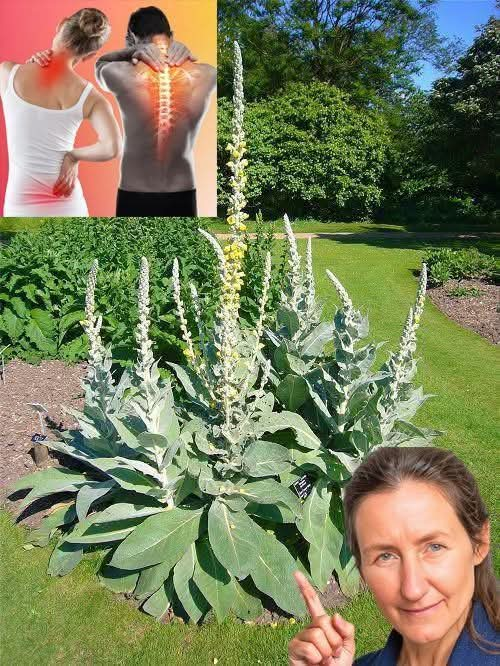Introduction
Mullein, a humble yet powerful herb, has been utilized for centuries across different cultures for its remarkable healing properties.
This plant, scientifically known as Verbascum thapsus, is often found growing in the wild, its tall stalks dotted with yellow flowers.
The leaves, flowers, and roots of the mullein plant are all packed with medicinal qualities that have been used to treat a wide range of ailments.
particularly those related to the respiratory system. From soothing coughs to alleviating congestion, mullein is a natural remedy worth considering for your health routine.
Ingredients
To create an infusion or extract from mullein, you’ll need the following ingredients:
Dried or fresh mullein leaves (or both, depending on availability)
Mullein flowers (optional but highly recommended for their added benefits)
Clean, filtered water
Honey (optional, for sweetness)
A jar or container for storage (for infusions or tinctures)
Instructions
Start by selecting high-quality mullein leaves, flowers, and roots, ideally from a trusted herbal supplier or from a clean, pesticide-free environment.
If using fresh herbs, make sure to thoroughly wash them to remove any dust or dirt. For dried herbs, ensure that they are well-preserved and free from mold or contaminants.
To make an infusion, begin by boiling water in a kettle. While the water is heating, place 1–2 teaspoons of dried mullein leaves (or a few fresh leaves) into a heatproof container.
You can also add a few mullein flowers for an extra boost of medicinal properties. Once the water reaches a boil.
pour it over the herbs and cover the container to let it steep for about 10–15 minutes. Strain the herbs from the liquid, and your mullein tea is ready.
For a stronger infusion, you can allow the herbs to steep for longer. Sweeten the tea with honey if desired, and enjoy this soothing beverage for its respiratory and anti-inflammatory benefits.
How to Make
Making a mullein tea or infusion is simple and requires only a few steps. First, place the desired amount of mullein leaves or flowers into a teapot or mug.
For a more potent effect, you may also include a small piece of the root. Add freshly boiled water over the herbs, making sure they’re submerged.
Let the herbs steep for 10 to 15 minutes. The longer you allow the herbs to infuse, the stronger and more potent the tea will be.
After steeping, strain the tea to remove any plant particles, as mullein leaves can be slightly irritating to the throat if consumed in large, unstrained amounts.
The resulting liquid will be rich in antioxidants and soothing compounds that are beneficial for your respiratory health.
Variations
Mullein can be combined with other herbs to enhance its healing properties. For example, blending mullein with elderflower can help relieve cold symptoms, such as congestion and coughs.
If you’re looking for extra anti-inflammatory effects, consider combining mullein with ginger or turmeric. These herbs together can create a potent tonic for both respiratory and digestive health.
Another variation is adding a few drops of essential oils like eucalyptus or peppermint to your mullein tea.
These oils can open up airways, providing relief for respiratory discomfort while complementing mullein’s benefits.
If you prefer a milder taste, you can add lemon to the infusion, as it can enhance both the flavor and the vitamin C content, boosting your immune system.
Tips
When preparing mullein tea, it’s important to use fresh, clean water and steep the herbs for the right amount of time.
If you’re new to mullein, start with a small amount to gauge how your body responds, and gradually increase the dosage if needed.
For the best results, drink mullein tea regularly, especially during cold and flu season, as its benefits are cumulative.
You can also store a batch of mullein infusion in the refrigerator for a few days, making it easy to access when needed.
If you prefer a stronger concentration of mullein, you can make a tincture by infusing the dried leaves and flowers in alcohol for several weeks and then straining it to use in small doses.
Be mindful not to overconsume mullein, as excessive intake can lead to mild digestive discomfort.
Always listen to your body, and consult with a healthcare professional if you have any pre-existing health conditions or concerns.
Conclusion
Mullein is a versatile and natural remedy that offers numerous health benefits, particularly for those dealing with respiratory issues.
Its leaves, flowers, and roots are all packed with healing compounds that can help alleviate coughs, reduce inflammation, and soothe the lungs.
By making mullein tea, infusions, or tinctures, you can easily incorporate this powerful herb into your wellness routine and experience its calming, restorative effects.
Whether you’re looking to support your respiratory health or seek a natural remedy for inflammation, mullein has a place in your herbal medicine cabinet.
With its rich history of medicinal use and the ease of preparation, mullein is a healing herb that is simple to integrate into your daily life.
